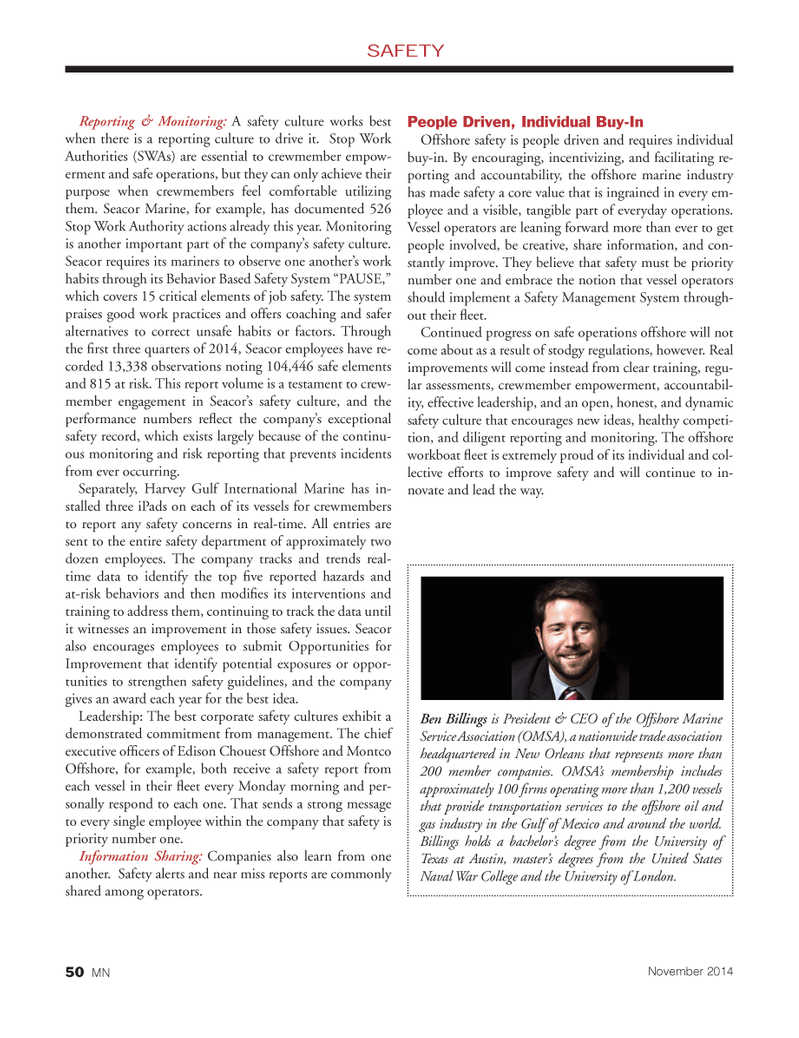
Page 50: of Marine News Magazine (November 2014)
Workboat Annual
Read this page in Pdf, Flash or Html5 edition of November 2014 Marine News Magazine
SAFETY
Reporting & Monitoring: A safety culture works best when there is a reporting culture to drive it. Stop Work
Authorities (SWAs) are essential to crewmember empow- erment and safe operations, but they can only achieve their purpose when crewmembers feel comfortable utilizing them. Seacor Marine, for example, has documented 526
Stop Work Authority actions already this year. Monitoring is another important part of the company’s safety culture.
Seacor requires its mariners to observe one another’s work habits through its Behavior Based Safety System “PAUSE,” which covers 15 critical elements of job safety. The system praises good work practices and offers coaching and safer alternatives to correct unsafe habits or factors. Through the fi rst three quarters of 2014, Seacor employees have re- corded 13,338 observations noting 104,446 safe elements and 815 at risk. This report volume is a testament to crew- member engagement in Seacor’s safety culture, and the performance numbers refl ect the company’s exceptional safety record, which exists largely because of the continu- ous monitoring and risk reporting that prevents incidents from ever occurring.
Separately, Harvey Gulf International Marine has in- stalled three iPads on each of its vessels for crewmembers to report any safety concerns in real-time. All entries are sent to the entire safety department of approximately two dozen employees. The company tracks and trends real- time data to identify the top fi ve reported hazards and at-risk behaviors and then modifi es its interventions and training to address them, continuing to track the data until it witnesses an improvement in those safety issues. Seacor also encourages employees to submit Opportunities for
Improvement that identify potential exposures or oppor- tunities to strengthen safety guidelines, and the company gives an award each year for the best idea.
Leadership: The best corporate safety cultures exhibit a demonstrated commitment from management. The chief executive offi cers of Edison Chouest Offshore and Montco
Offshore, for example, both receive a safety report from each vessel in their fl eet every Monday morning and per- sonally respond to each one. That sends a strong message to every single employee within the company that safety is priority number one.
Information Sharing: Companies also learn from one another. Safety alerts and near miss reports are commonly shared among operators.
People Driven, Individual Buy-In
Offshore safety is people driven and requires individual buy-in. By encouraging, incentivizing, and facilitating re- porting and accountability, the offshore marine industry has made safety a core value that is ingrained in every em- ployee and a visible, tangible part of everyday operations.
Vessel operators are leaning forward more than ever to get people involved, be creative, share information, and con- stantly improve. They believe that safety must be priority number one and embrace the notion that vessel operators should implement a Safety Management System through- out their fl eet.
Continued progress on safe operations offshore will not come about as a result of stodgy regulations, however. Real improvements will come instead from clear training, regu- lar assessments, crewmember empowerment, accountabil- ity, effective leadership, and an open, honest, and dynamic safety culture that encourages new ideas, healthy competi- tion, and diligent reporting and monitoring. The offshore workboat fl eet is extremely proud of its individual and col- lective efforts to improve safety and will continue to in- novate and lead the way.
Ben Billings is President & CEO of the Offshore Marine
Service Association (OMSA), a nationwide trade association headquartered in New Orleans that represents more than 200 member companies. OMSA’s membership includes approximately 100 fi rms operating more than 1,200 vessels that provide transportation services to the offshore oil and gas industry in the Gulf of Mexico and around the world.
Billings holds a bachelor’s degree from the University of
Texas at Austin, master’s degrees from the United States
Naval War College and the University of London.
November 2014 50 MN
MN Nov14 Layout 50-65.indd 50 10/23/2014 10:38:08 AM

 49
49

 51
51
